Charles E W Bean, Diaries, AWM38 3DRL 606/28A/1 - 1920
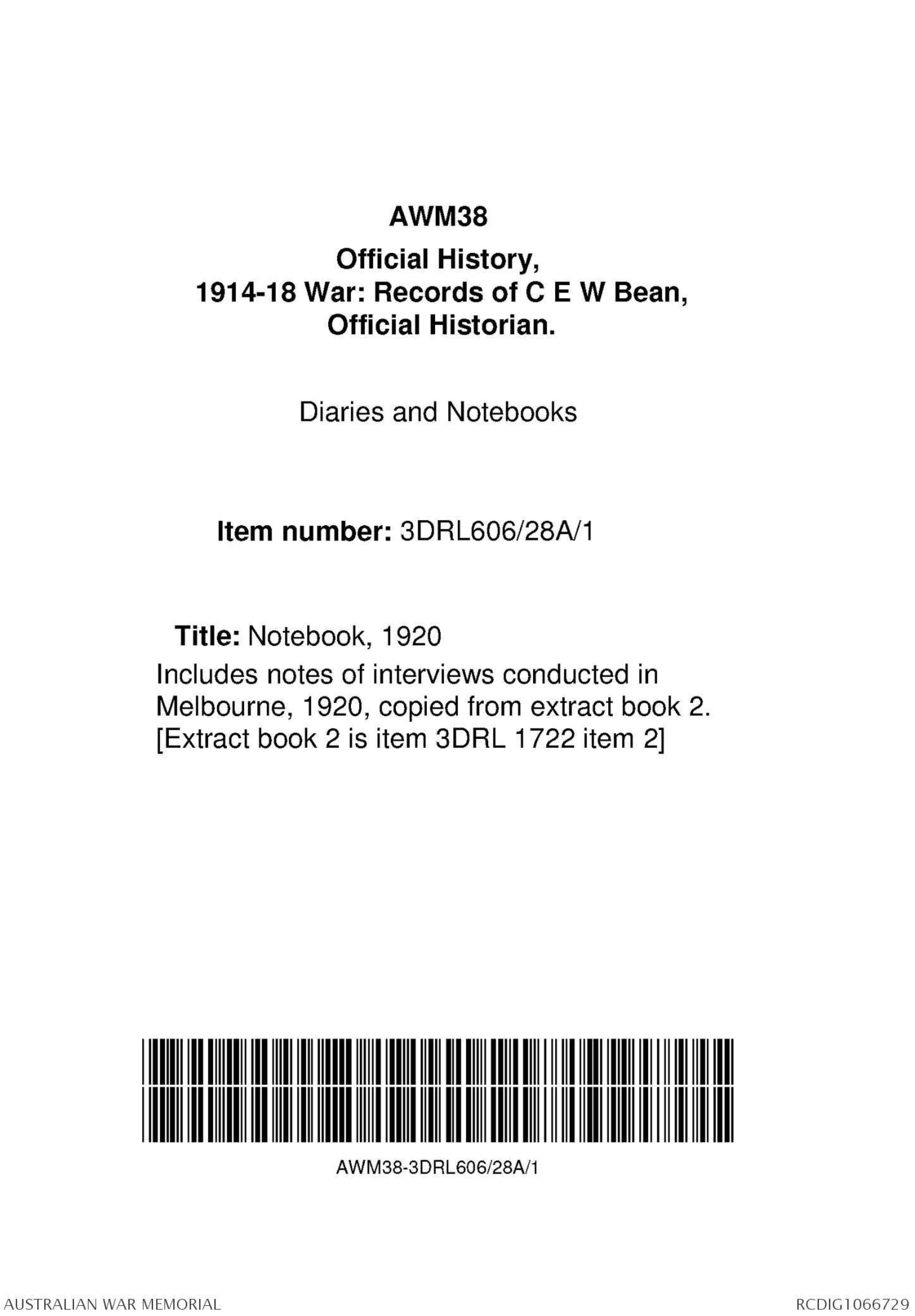
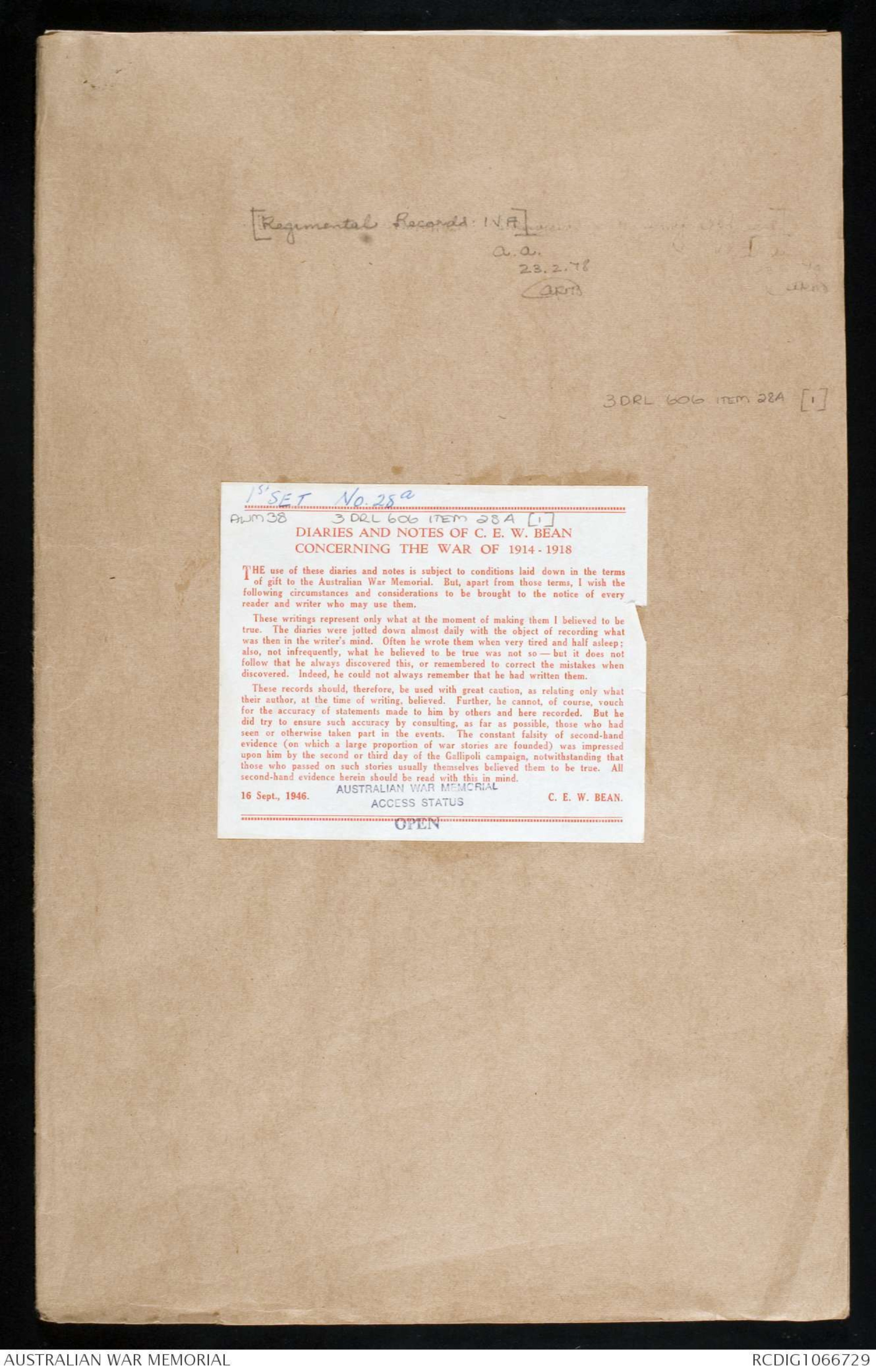
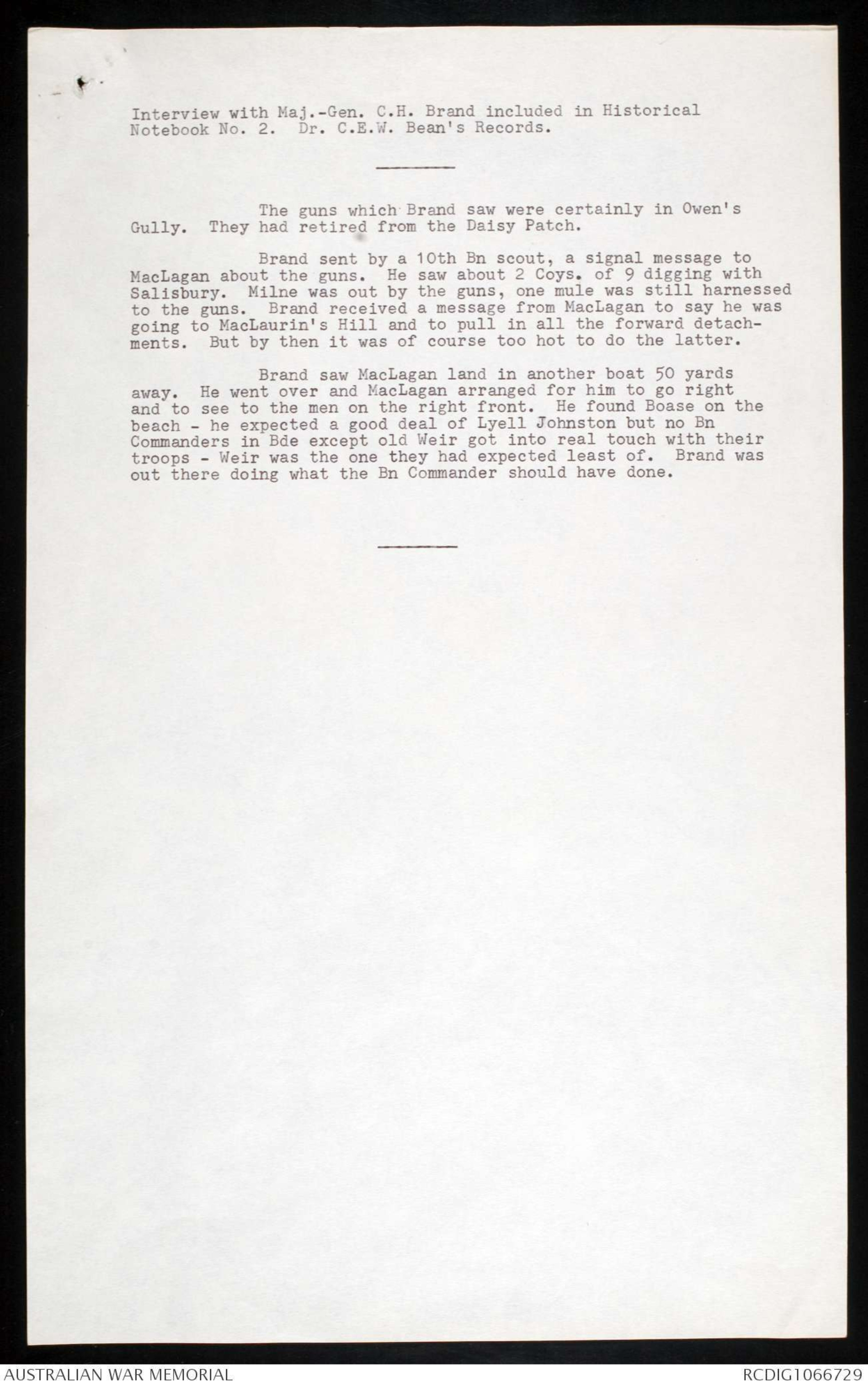
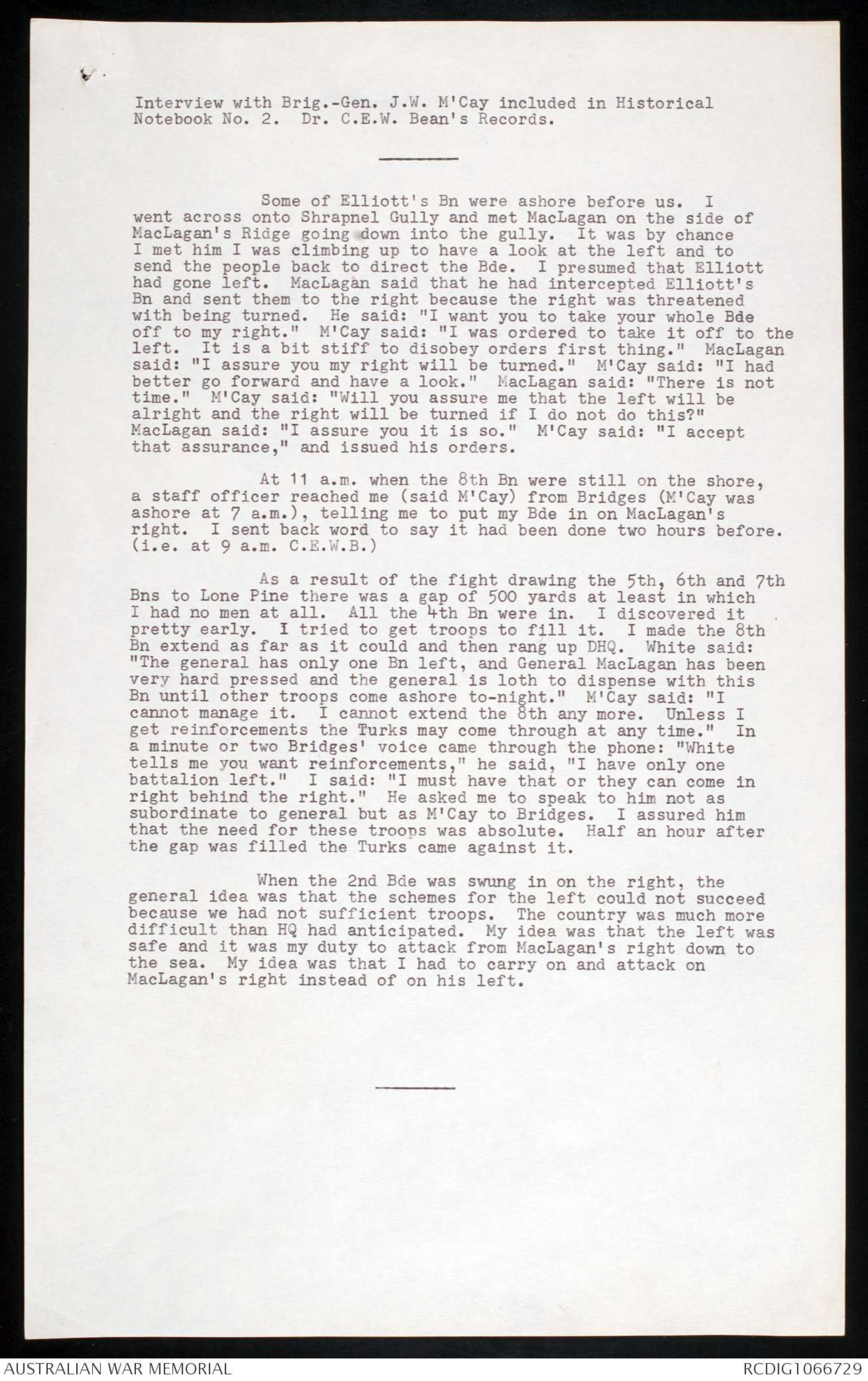
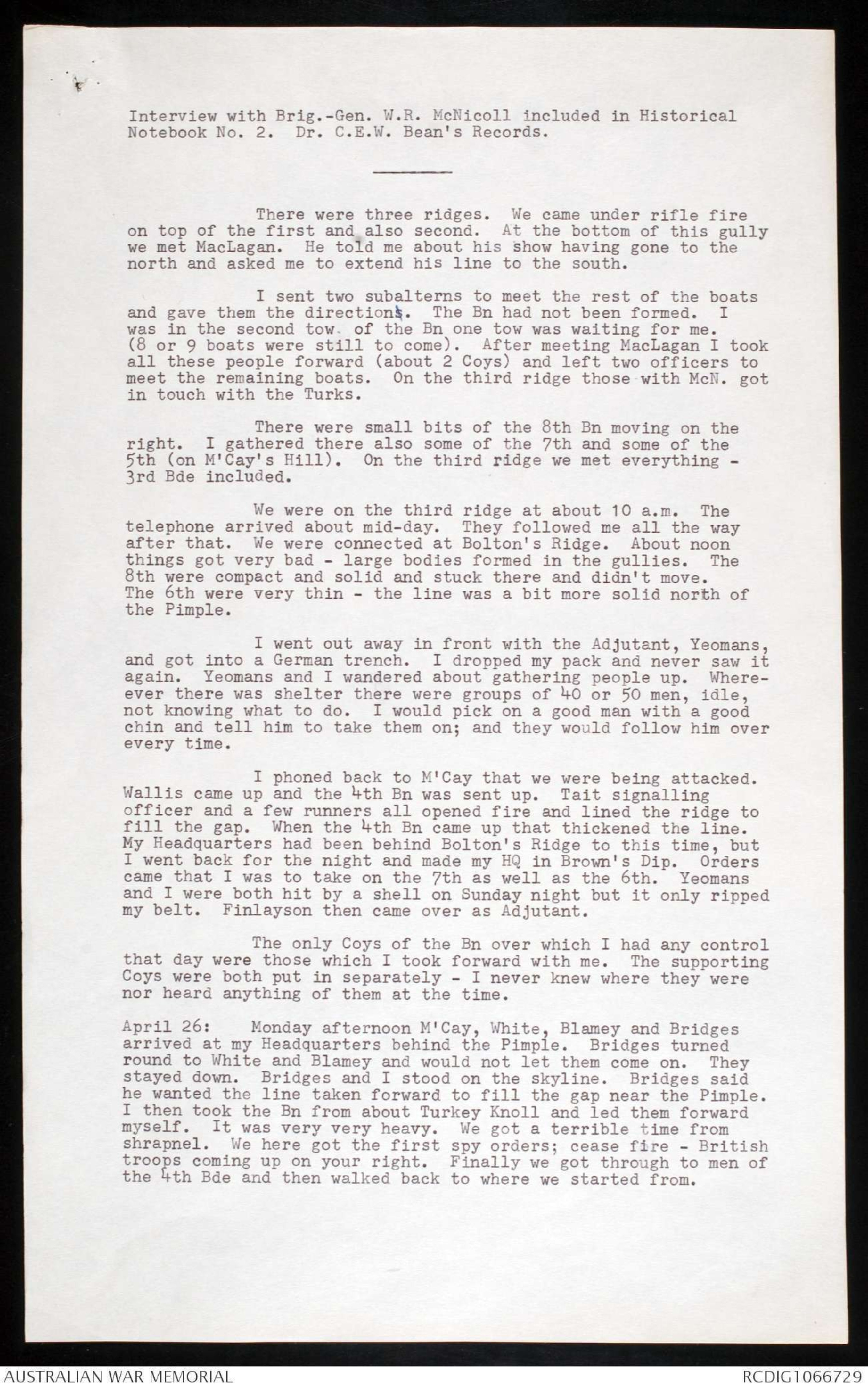
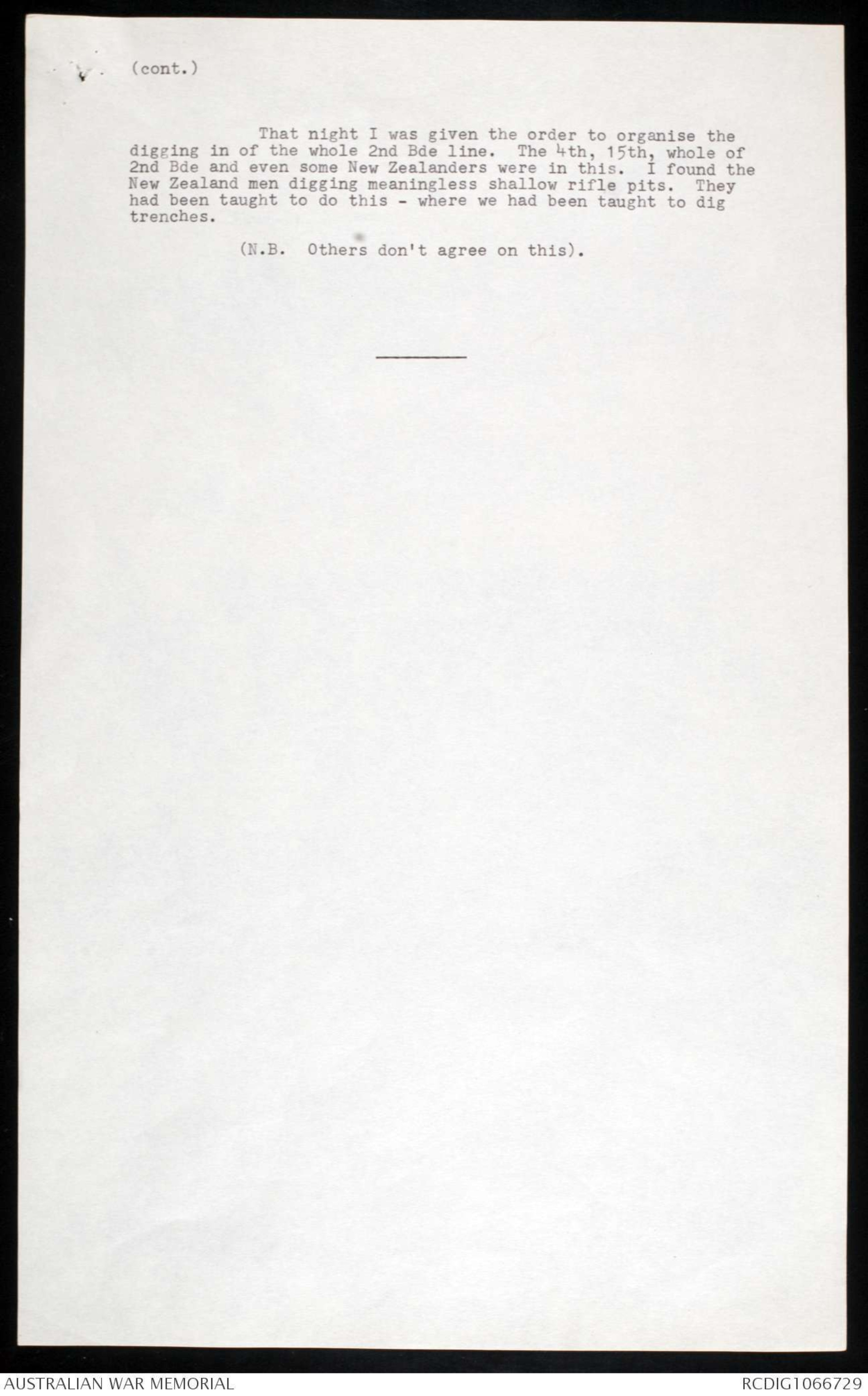
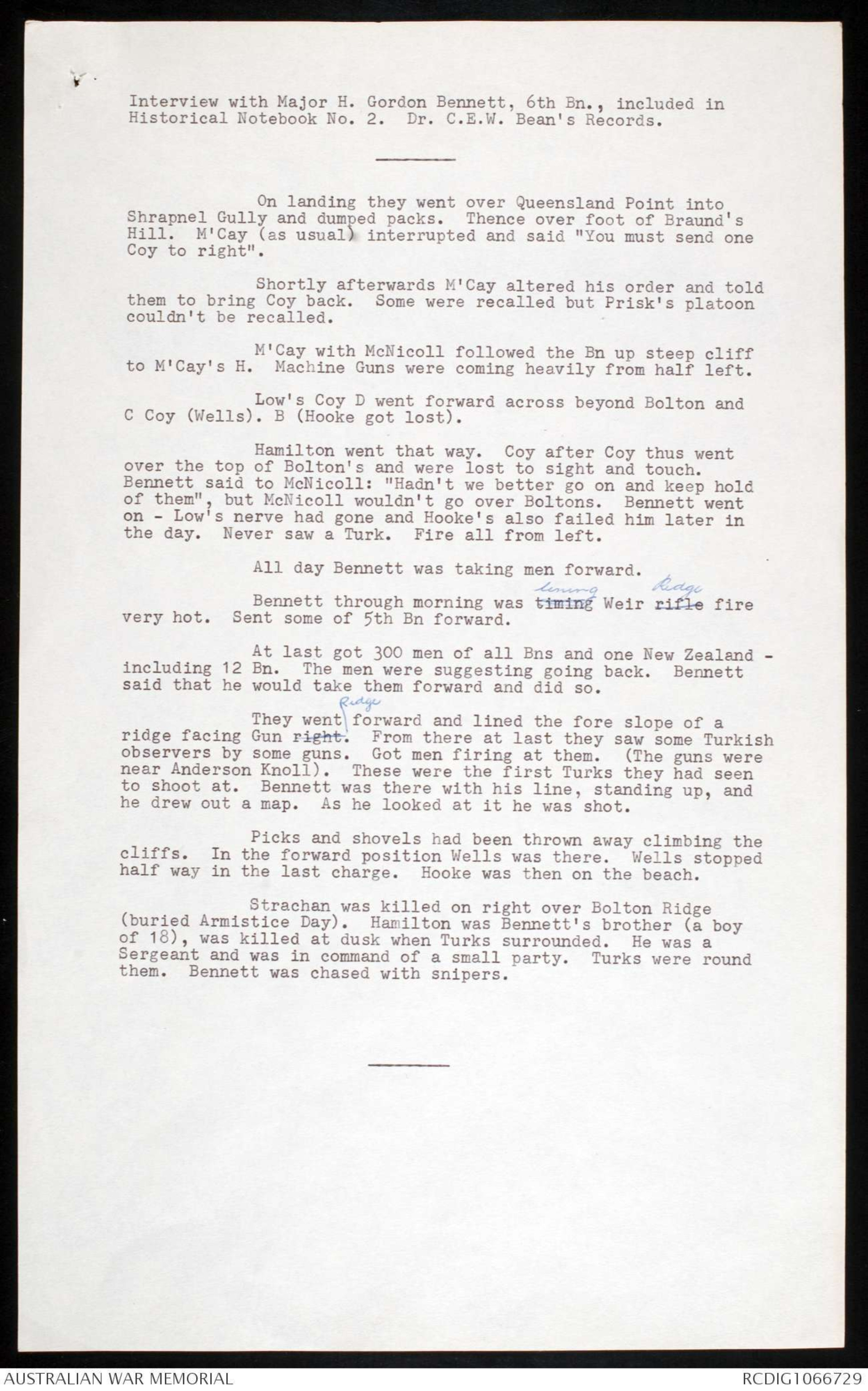
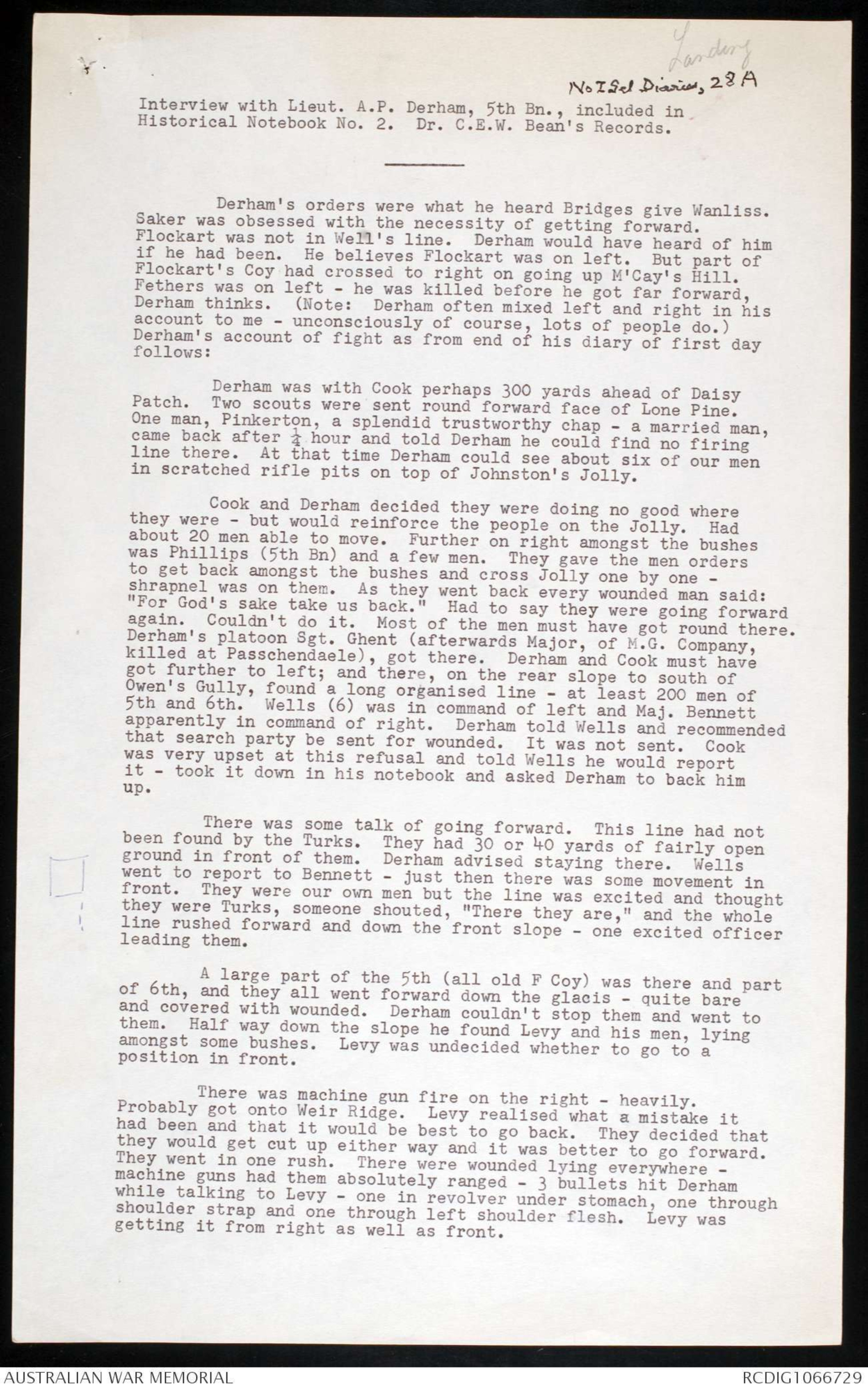
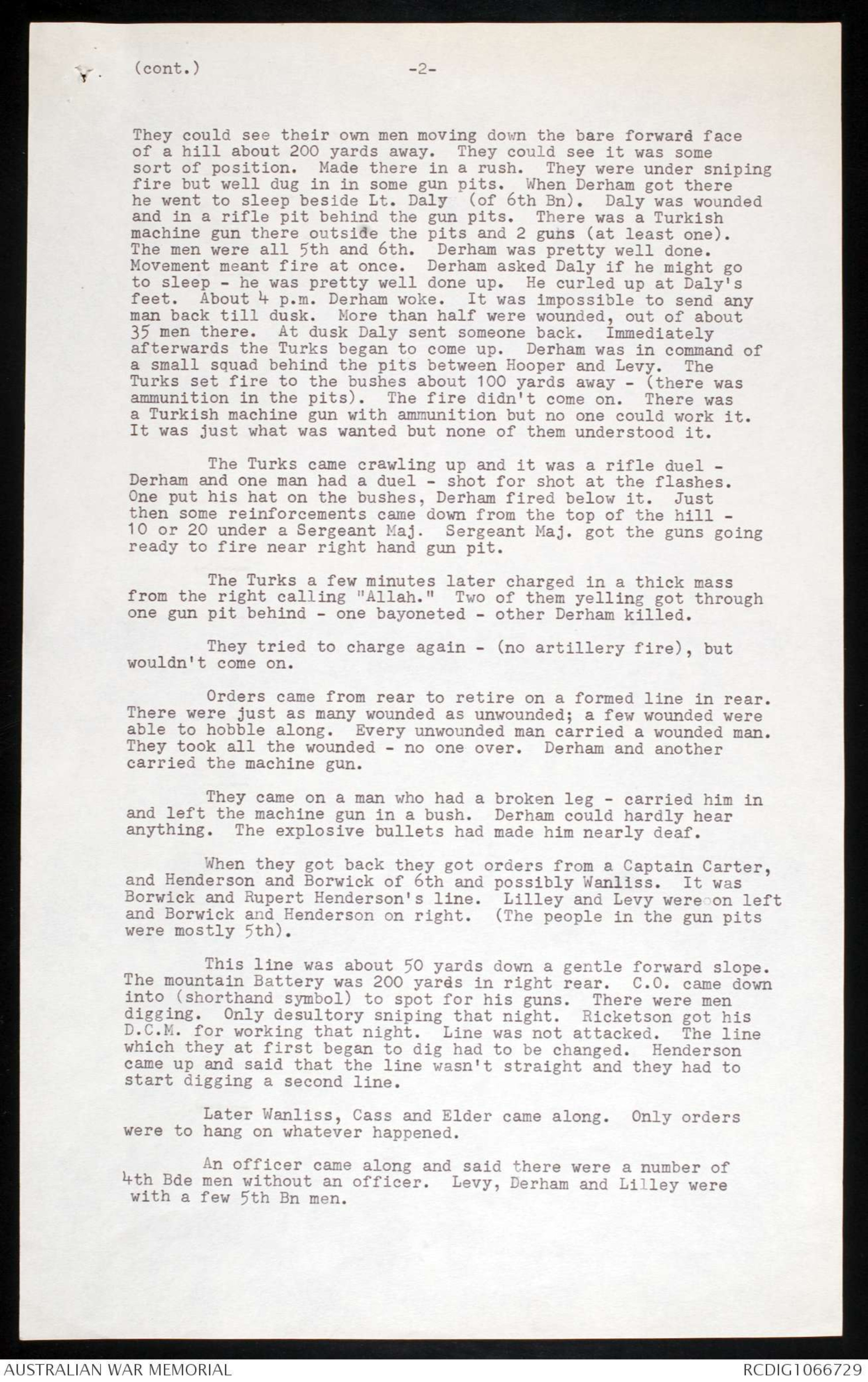
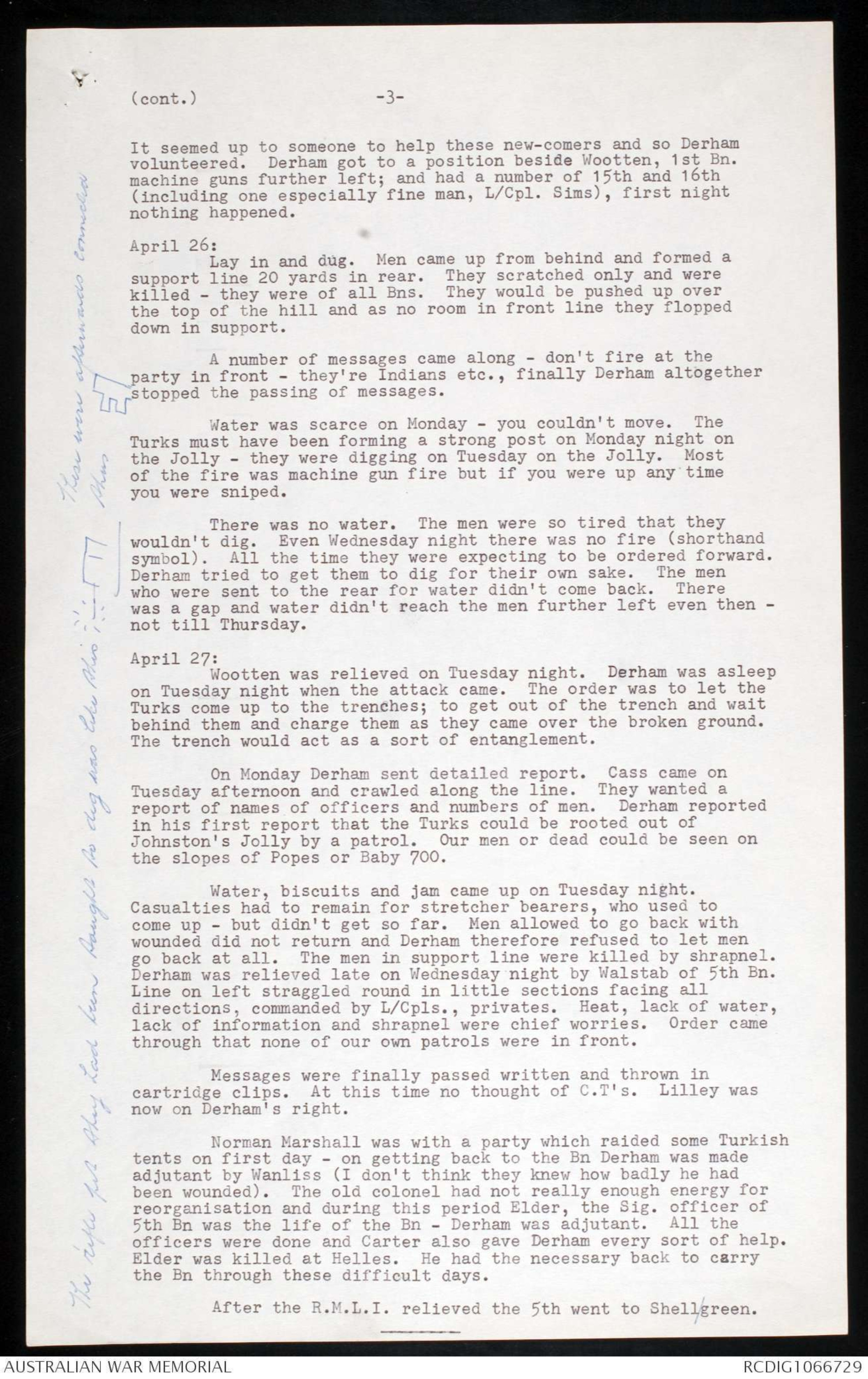
AWM38
Official History,
1914-18 War: Records of C E W Bean,
Official Historian.
Diaries and Notebooks
Item number 3DRL606/28A/1
Title: Notebook, 1920
Includes notes of interviews conducted in
Melbourne, 1920, copied from extract book 2.
[Extract book 2 is item 3DRL 1722 item 2]
AWM38-3DRL606/28A/1
[Regimental Records: IVA]
a.a.
23.2.78 [[ARMS?]]
3DRL 606 ITEM 28A [1]
1st SET No.28a
AWM 38 3DRL 606 ITEM 28A [1]
DIARIES AND NOTES OF C. E. W. BEAN
CONCERNING THE WAR OF 1914 - 1918
THE use of these diaries and notes is subject to conditions laid down in the terms
of gift to the Australian War Memorial. But, apart from those terms, I wish the
following circumstances and considerations to be brought to the notice of every
reader and writer who may use them.
These writings represent only what at the moment of making them I believed to be
true. The diaries were jotted down almost daily with the object of recording what
was then in the writer's mind. Often he wrote them when very tired and half asleep;
also, not infrequently, what he believed to be true was not so –- but it does not
follow that he always discovered this, or remembered to correct the mistakes when
discovered. Indeed, he could not always remember that he had written them.
These records should, therefore, be used with great caution, as relating only what
their author, at the time of writing, believed. Further, he cannot of course, vouch
for the accuracy of statements made to him by others and here recorded. But he
did try to ensure such accuracy by consulting, as far as possible, those who had
seen or otherwise taken part in the events. The constant falsity of second-hand
evidence (on which a large proportion of war stories are founded) was impressed
upon him by the second or third day of the Gallipoli campaign, notwithstanding that
those who passed on such stories usually themselves believed them to be true. All
second-hand evidence herein should be read with this in mind.
16 Sept, 1946.
AUSTRALIAN WAR MEMORIAL
ACCESS STATUS
OPEN
C. E. W. BEAN.
Interview with Maj.-Gen. C.H. Brand included in Historical
Notebook No. 2. Dr. C.E.W. Bean's Records.
---------
The guns which Brand saw were certainly in Owen's
Gully. They had retired from the Daisy Patch.
Brand sent by a 10th Bn scout, a signal message to
MacLagan about the guns. He saw about 2 Coys. of 9 digging with
Salisbury. Milne was out by the guns, one mule was still harnessed
to the guns. Brand received a message from MacLagan to say he was
going to MacLaurin's Hill and to pull in all the forward detachments.
But by then it was of course too hot to do the latter.
Brand saw MacLagan land in another boat 50 yards
away. He went over and MacLagan arranged for him to go right
and to see to the men on the right front. He found Boase on the
beach - he expected a good deal of Lyell Johnston but no Bn
Commanders in Bde except old Weir got into real touch with their
troops - Weir was the one they had expected least of. Brand was
out there doing what the Bn Commander should have done.
--------
Interview with Brig.-Gen. J.W. M'Cay included in Historical
Notebook No. 2. Dr. C.E.W. Bean's Records.
------
Some of Elliott's Bn were ashore before us. I
went across onto Shrapnel Gully and met MacLagan on the side of
MacLagan's Ridge going down into the gully. It was by chance
I met him I was climbing up to have a look at the left and to
send the people back to direct the Bde. I presumed that Elliott
had gone left. MacLagan said that he had intercepted Elliott's
Bn and sent them to the right because the right was threatened
with being turned. He said: "I want you to take your whole Bde
off to my right." M'Cay said: "I was ordered to take it off to the
left. It is a bit stiff to disobey orders first thing." MacLagan
said: "I assure you my right will be turned." M'Cay said: "I had
better go forward and have a look." MacLagan said: "There is not
time." M'Cay said: "Will you assure me that the left will be
alright and the right will be turned if I do not do this?"
MacLagan said: "I assure you it is so." M'Cay said: "I accept
that assurance," and issued his orders.
At 11 a.m. when the 8th Bn were still on the shore,
a staff officer reached me (said M'Cay) from Bridges (M'Cay was
ashore at 7 a.m.), telling me to put my Bde in on MacLagan's
right. I sent back word to say it had been done two hours before.
(i.e. at 9 a.m. C.E.W.B.)
As a result of the fight drawing the 5th, 6th and 7th
Bns to Lone Pine there was a gap of 500 yards at least in which
I had no men at all. All the 4th Bn were in. I discovered it
pretty early. I tried to get troops to fill it. I made the 8th
Bn extend as far as it could and then rang up DHQ. White said:
"The general has only one Bn left, and General MacLagan has been
very hard pressed and the general is loth to dispense with this
Bn until other troops come ashore to-night." M'Cay said: "I
cannot manage it. I cannot extend the 8th any more. Unless I
get reinforcements the Turks may come through at any time." In
a minute or two Bridges' voice came through the phone: "White
tells me you want reinforcements," he said, "I have only one
battalion left." I said: "I must have that or they can come in
right behind the right." He asked me to speak to him not as
subordinate to general but as M'Cay to Bridges. I assured him
that the need for these troops was absolute. Half an hour after
the gap was filled the Turks came against it.
When the 2nd Bde was swung in on the right, the
general idea was that the schemes for the left could not succeed
because we had not sufficient troops. The country was much more
difficult than HQ had anticipated. My idea was that the left was
safe and it was my duty to attack from MacLagan's right down to
the sea. My idea was that I had to carry on and attack on
MacLagan's right instead of on his left.
------
Interview with Brig.-Gen. W.R. McNicoll included in Historical
Notebook No. 2. Dr. C.E.W. Bean's Records.
--------
There were three ridges. We came under rifle fire
on top of the first and also second. At the bottom of this gully
we met MacLagan. He told me about his show having gone to the
north and asked me to extend his line to the south.
I sent two subalterns to meet the rest of the boats
and gave them the directions. The Bn had not been formed. I
was in the second tow of the Bn one tow was waiting for me.
(8 or 9 boats were still to come). After meeting MacLagan I took
all these people forward (about 2 Coys) and left two officers to
meet the remaining boats. On the third ridge those with McN. got
in touch with the Turks.
There were small bits of the 8th Bn moving on the
right. I gathered there also some of the 7th and some of the
5th (on M'Cay's Hill). On the third ridge we met everything -
3rd Bde included.
We were on the third ridge at about 10 a.m. The
telephone arrived about mid-day. They followed me all the way
after that. We were connected at Bolton's Ridge. About noon
things got very bad - large bodies formed in the gullies. The
8th were compact and solid and stuck there and didn't move.
The 6th were very thin - the line was a bit more solid north of
the Pimple.
I went out away in front with the Adjutant, Yeomans,
and got into a German trench. I dropped my pack and never saw it
again. Yeomans and I wandered about gathering people up. Where -
ever there was shelter there were groups of 40 or 50 men, idle,
not knowing what to do. I would pick on a good man with a good
chin and tell him to take them on; and they would follow him over
every time.
I phoned back to M'Cay that we were being attacked.
Wallis came up and the 4th Bn was sent up. Tait signalling
officer and a few runners all opened fire and lined the ridge to
fill the gap. When the 4th Bn came up that thickened the line.
My Headquarters had been behind Bolton's Ridge to this time, but
I went back for the night and made my HQ in Brown's Dip. Orders
came that I was to take on the 7th as well as the 6th. Yeomans
and I were both hit by a shell on Sunday night but it only ripped
my belt. Finlayson then came over as Adjutant.
The only Coys of the Bn over which I had any control
that day were those which I took forward with me. The supporting
Coys were both put in separately - I never knew where they were
nor heard anything of them at the time.
April 26: Monday afternoon M'Cay, White, Blamey and Bridges
arrived at my Headquarters behind the Pimple. Bridges turned
round to White and Blamey and would not let them come on. They
stayed down. Bridges and I stood on the skyline. Bridges said
he wanted the line taken forward to fill the gap near the Pimple.
I then took the Bn from about Turkey Knoll and led them forward
myself. It was very very heavy. We got a terrible time from
shrapnel. We here got the first spy orders; cease fire - British
troops coming up on your right. Finally we got through to men of
the 4th Bde and then walked back to where we started from.
(cont.)
That night I was given the order to organise the
digging in of the whole 2nd Bde line. The 4th, 15th, whole of
2nd Bde and even some New Zealanders were in this. I found the
New Zealand men digging meaningless shallow rifle pits. They
had been taught to do this - where we had been taught to dig
trenches.
(N.B. Others don't agree on this).
-------
Interview with Major H. Gordon Bennett, 6th Bn., included in
Historical Notebook No. 2. Dr. C.E.W. Bean's Records.
-------
On landing they went over Queensland Point into
Shrapnel Gully and dumped packs. Thence over foot of Braund's
Hill. M'Cay (as usual) interrupted and said "You must send one
Coy to right".
Shortly afterwards M'Cay altered his order and told
them to bring Coy back. Some were recalled but Prisk's platoon
couldn't be recalled.
M'Cay with McNicoll followed the Bn up steep cliff
to M'Cay's H. Machine Guns were coming heavily from half left.
Low's Coy D went forward across beyond Bolton and
C Coy (Wells). B (Hooke got lost).
Hamilton went that way. Coy after Coy thus went
over the top of Bolton's and were lost to sight and touch.
Bennett said to McNicoll: "Hadn't we better go on and keep hold
of them", but McNicoll wouldn't go over Boltons. Bennett went
on - Low's nerve had gone and Hooke's also failed him later in
the day. Never saw a Turk. Fire all from left.
All day Bennett was taking men forward.
Bennett through morning was timing lining Weir rifle Ridge fire
very hot. Sent some of 5th Bn forward.
At last got 300 men of all Bns and one New Zealand -
including 12 Bn. The men were suggesting going back. Bennett
said that he would take them forward and did so.
They went forward and lined the fore slope of a
ridge facing Gun right Ridge. From there at last they saw some Turkish
observers by some guns. Got men firing at them. (The guns were
near Anderson Knoll). These were the first Turks they had seen
to shoot at. Bennett was there with his line, standing up, and
he drew out a map. As he looked at it he was shot.
Picks and shovels had been thrown away climbing the
cliffs. In the forward position Wells was there. Wells stopped
half way in the last charge. Hooke was then on the beach.
Strachan was killed on right over Bolton Ridge
(buried Armistice Day). Hamilton was Bennett's brother (a boy
of 18), was killed at dusk when Turks surrounded. He was a
Sergeant and was in command of a small party. Turks were round
them. Bennett was chased with snipers.
------
[*Landing*]
No 1 Sel Diaries, 28A
Interview with Lieut. A.P. Derham, 5th Bn., included in
Historical Notebook No. 2. Dr. C.E.W. Bean's Records.
------
Derham's orders were what he heard Bridges give Wanliss.
Saker was obsessed with the necessity of getting forward.
Flockart was not in Well's line. Derham would have heard of him
if he had been. He believes Flockart was on left. But part of
Flockart's Coy had crossed to right on going up M'Cay's Hill.
Fethers was on left - he was killed before he got far forward,
Derham thinks. (Note: Derham often mixed left and right in his
account to me - unconsciously of course, lots of people do.)
Derham's account of fight as from end of his diary of first day
follows:
Derham was with Cook perhaps 300 yards ahead of Daisy
Patch. Two scouts were sent round forward face of Lone Pine.
One man, Pinkerton, a splendid trustworthy chap - a married man,
came back after 1/4 hour and told Derham he could find no firing
line there. At that time Derham could see about six of our men
in scratched rifle pits on top of Johnston's Jolly.
Cook and Derham decided they were doing no good where
they were - but would reinforce the people on the Jolly. Had
about 20 men able to move. Further on right amongst the bushes
was Phillips (5th Bn) and a few men. They gave the men orders
to get back amongst the bushes and cross Jolly one by one -
shrapnel was on them. As they went back every wounded man said:
"For God's sake take us back." Had to say they were going forward
again. Couldn't do it. Most of the men must have got round there.
Derham's platoon Sgt. Ghent (afterwards Major, of M.G. Company,
killed at Passchendaele), got there. Derham and Cook must have
got further to left; and there, on the rear slope to south of
Owen's Gully, found a long organised line - at least 200 men of
5th and 6th. Wells (6) was in command of left and Maj. Bennett
apparently in command of right. Derham told Wells and recommended
that search party be sent for wounded. It was not sent. Cook
was very upset at this refusal and told Wells he would report
it - took it down in his notebook and asked Derham to back him
up.
There was some talk of going forward. This line had not
been found by the Turks. They had 30 or 40 yards of fairly open
ground in front of them. Derham advised staying there. Wells
went to report to Bennett - just then there was some movement in
front. They were our own men but the line was excited and thought
they were Turks, someone shouted, "There they are," and the whole
line rushed forward and down the front slope - one excited officer
leading them.
[*diagram - see original document*]
A large part of the 5th (all old F Coy) was there and part
of 6th, and they all went forward down the glacis - quite bare
and covered with wounded. Derham couldn't stop them and went to
them. Half way down the slope he found Levy and his men, lying
amongst some bushes. Levy was undecided whether to go to a
position in front.
There was machine gun fire on the right - heavily.
Probably got onto Weir Ridge. Levy realised what a mistake it
had been and that it would be best to go back. They decided that
they would get cut up either way and it was better to go forward.
They went in one rush. There were wounded lying everywhere -
machine guns had them absolutely ranged - 3 bullets hit Derham
while talking to Levy - one in revolver under stomach, one through
shoulder strap and one through left shoulder flesh. Levy was
getting it from right as well as front.
(cont.) -2-
They could see their own men moving down the bare forward face
of a hill about 200 yards away. They could see it was some
sort of position. Made there in a rush. They were under sniping
fire but well dug in in some gun pits. When Derham got there
he went to sleep beside Lt. Daly (of 6th Bn). Daly was wounded
and in a rifle pit behind the gun pits. There was a Turkish
machine gun there outside the pits and 2 guns (at least one).
The men were all 5th and 6th. Derham was pretty well done.
Movement meant fire at once. Derham asked Daly if he might go
to sleep - he was pretty well done up. He curled up at Daly's
feet. About 4 p.m. Derham woke. It was impossible to send any
man back till dusk. More than half were wounded, out of about
35 men there. At dusk Daly sent someone back. Immediately
afterwards the Turks began to come up. Derham was in command of
a small squad behind the pits between Hooper and Levy. The
Turks set fire to the bushes about 100 yards away - (there was
ammunition in the pits). The fire didn't come on. There was
a Turkish machine gun with ammunition but no one could work it.
It was just what was wanted but none of them understood it.
The Turks came crawling up and it was a rifle duel -
Derham and one man had a duel - shot for shot at the flashes.
One put his hat on the bushes, Derham fired below it. Just
then some reinforcements came down from the top of the hill -
10 or 20 under a Sergeant Maj. Sergeant Maj. got the guns going
ready to fire near right hand gun pit.
The Turks a few minutes later charged in a thick mass
from the right calling "Allah." Two of them yelling got through
one gun pit behind - one bayoneted - other Derham killed.
They tried to charge again - (no artillery fire), but
wouldn't come on.
Orders came from rear to retire on a formed line in rear.
There were just as many wounded as unwounded; a few wounded were
able to hobble along. Every unwounded man carried a wounded man.
They took all the wounded - no one over. Derham and another
carried the machine gun.
They came on a man who had a broken leg - carried him in
and left the machine gun in a bush. Derham could hardly hear
anything. The explosive bullets had made him nearly deaf.
When they got back they got orders from a Captain Carter,
and Henderson and Borwick of 6th and possibly Wanliss. It was
Borwick and Rupert Henderson's line. Lilley and Levy were on left
and Borwick and Henderson on right. (The people in the gun pits
were mostly 5th).
This line was about 50 yards down a gentle forward slope.
The mountain Battery was 200 yards in right rear. C.O. came down
into (shorthand symbol) to spot for his guns. There were men
digging. Only desultory sniping that night. Ricketson got his
D.C.M. for working that night. Line was not attacked. The line
which they at first began to dig had to be changed. Henderson
came up and said that the line wasn't straight and they had to
start digging a second line.
Later Wanliss, Cass and Elder came along. Only orders
were to hang on whatever happened.
An officer came along and said there were a number of
4th Bde men without an officer. Levy, Derham and Lilley were
with a few 5th Bn men.
[*The rifle pit they had been taught to dig was like this diagram-see original document. These were afterwards connected thus diagram-see original document*]
(cont.) -3-
It seemed up to someone to help these new-comers and so Derham
volunteered. Derham got to a position beside Wootten, 1st Bn.
machine guns further left; and had a number of 15th and 16th
(including one especially fine man, L/Cpl. Sims), first night
nothing happened.
April 26:
Lay in and dug. Men came up from behind and formed a
support line 20 yards in rear. They scratched only and were
killed - they were of all Bns. They would be pushed up over
the top of the hill and as no room in front line they flopped
down in support.
A number of messages came along - don't fire at the
party in front - they're Indians etc., finally Derham altogether
stopped the passing of messages.
Water was scarce on Monday - you couldn't move. The
Turks must have been forming a strong post on Monday night on
the Jolly - they were digging on Tuesday on the Jolly. Most
of the fire was machine gun fire but if you were up any time
you were sniped.
There was no water. The men were so tired that they
wouldn't dig. Even Wednesday night there was no fire (shorthand
symbol). All the time they were expecting to be ordered forward.
Derham tried to get them to dig for their own sake. The men
who were sent to the rear for water didn't come back. There
was a gap and water didn't reach the men further left even then -
not till Thursday.
April 27:
Wootten was relieved on Tuesday night. Derham was asleep
on Tuesday night when the attack came. The order was to let the
Turks come up to the trenches; to get out of the trench and wait
behind them and charge them as they came over the broken ground.
The trench would act as a sort of entanglement.
On Monday Derham sent detailed report. Cass came on
Tuesday afternoon and crawled along the line. They wanted a
report of names of officers and numbers of men. Derham reported
in his first report that the Turks could be rooted out of
Johnston's Jolly by a patrol. Our men or dead could be seen on
the slopes of Popes or Baby 700.
Water, biscuits and jam came up on Tuesday night.
Casualties had to remain for stretcher bearers, who used to
come up - but didn't get so far. Men allowed to go back with
wounded did not return and Derham therefore refused to let men
go back at all. The men in support line were killed by shrapnel.
Derham was relieved late on Wednesday night by Walstab of 5th Bn.
Line on left straggled round in little sections facing all
directions, commanded by L/Cpls., privates. Heat, lack of water,
lack of information and shrapnel were chief worries. Order came
through that none of our own patrols were in front.
Messages were finally passed written and thrown in
cartridge clips. At this time no thought of C.T's. Lilley was
now on Derham's right.
Norman Marshall was with a party which raided some Turkish
tents on first day - on getting back to the Bn Derham was made
adjutant by Wanliss (I don't think they knew how badly he had
been wounded). The old colonel had not really enough energy for
reorganisation and during this period Elder, the Sig. officer of
5th Bn was the life of the Bn - Derham was adjutant. All the
officers were done and Carter also gave Derham every sort of help.
Elder was killed at Helles. He had the necessary back to carry
the Bn through these difficult days.
After the R.M.L.I. relieved the 5th went to Shell/green.
 Sam scott
Sam scottThis transcription item is now locked to you for editing. To release the lock either Save your changes or Cancel.
This lock will be automatically released after 60 minutes of inactivity.